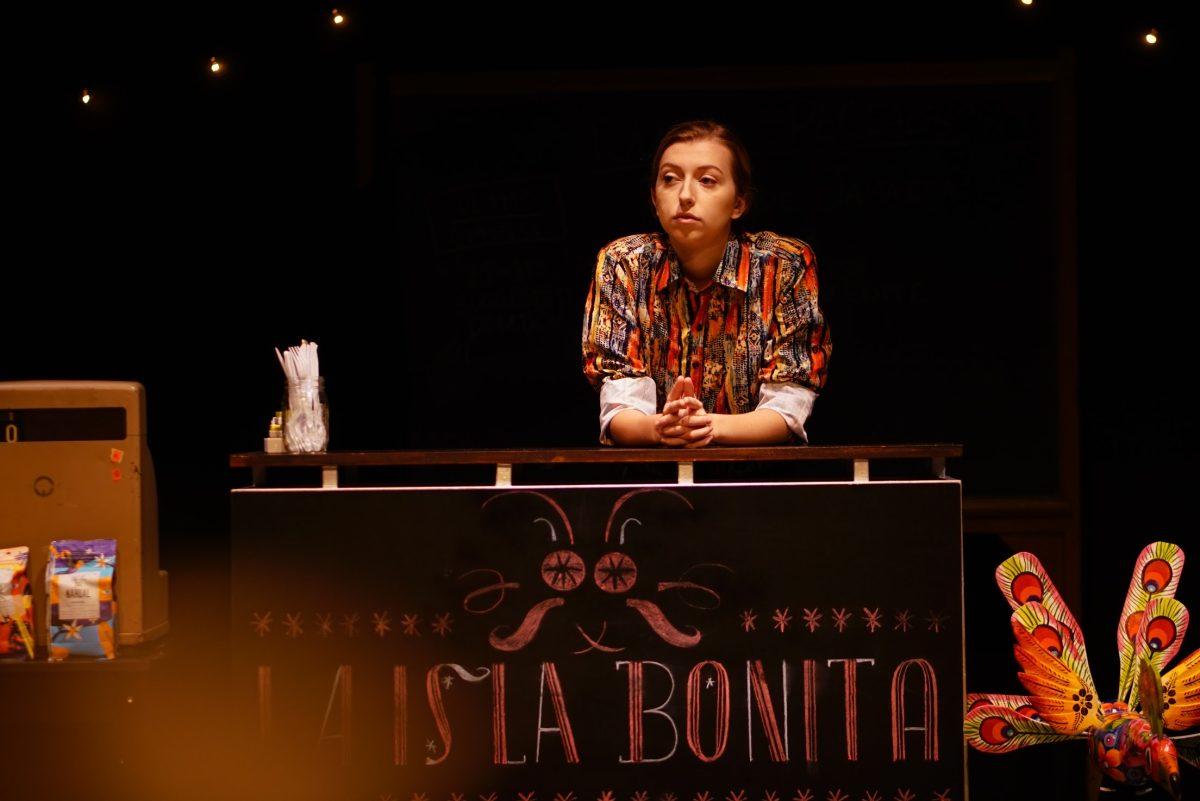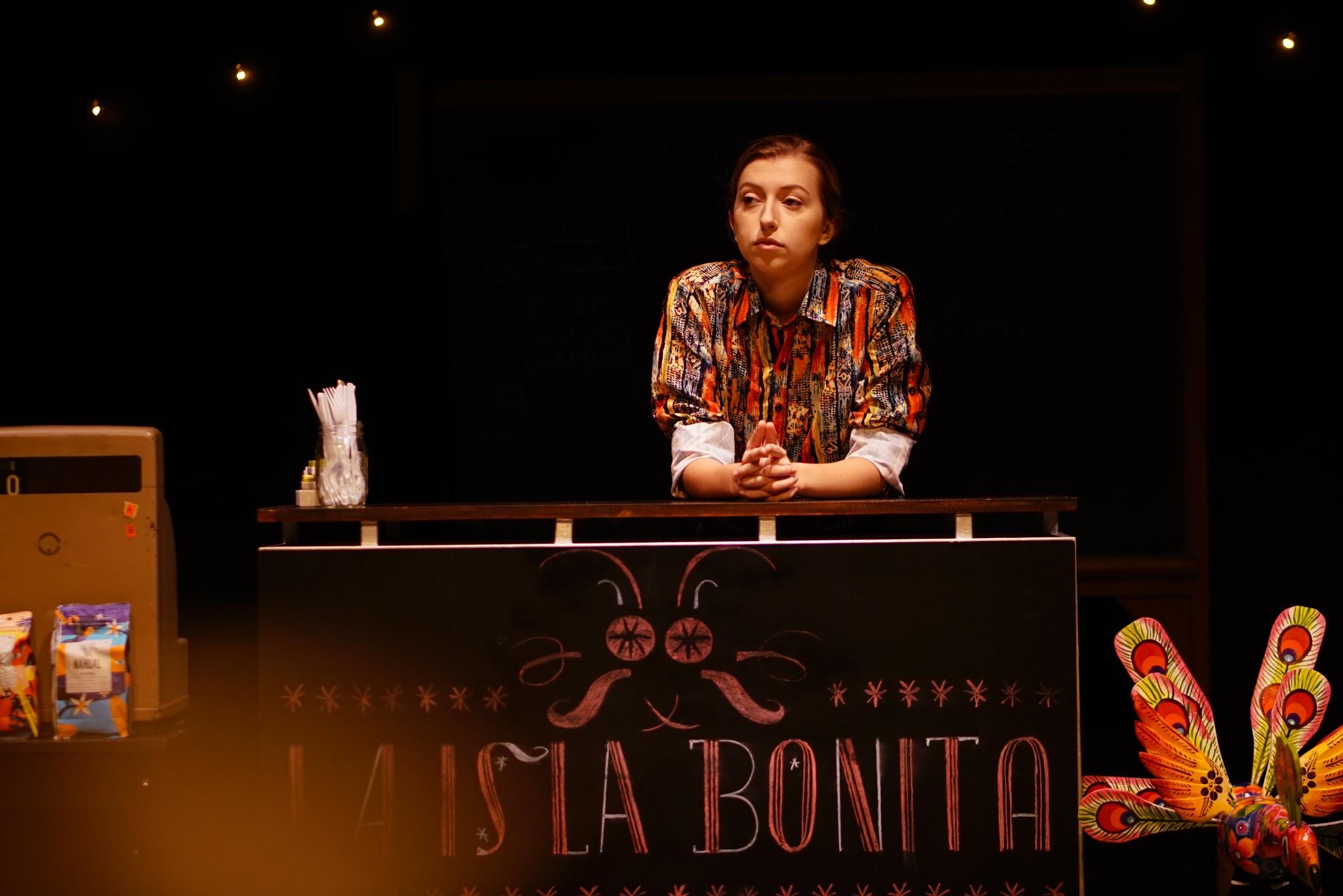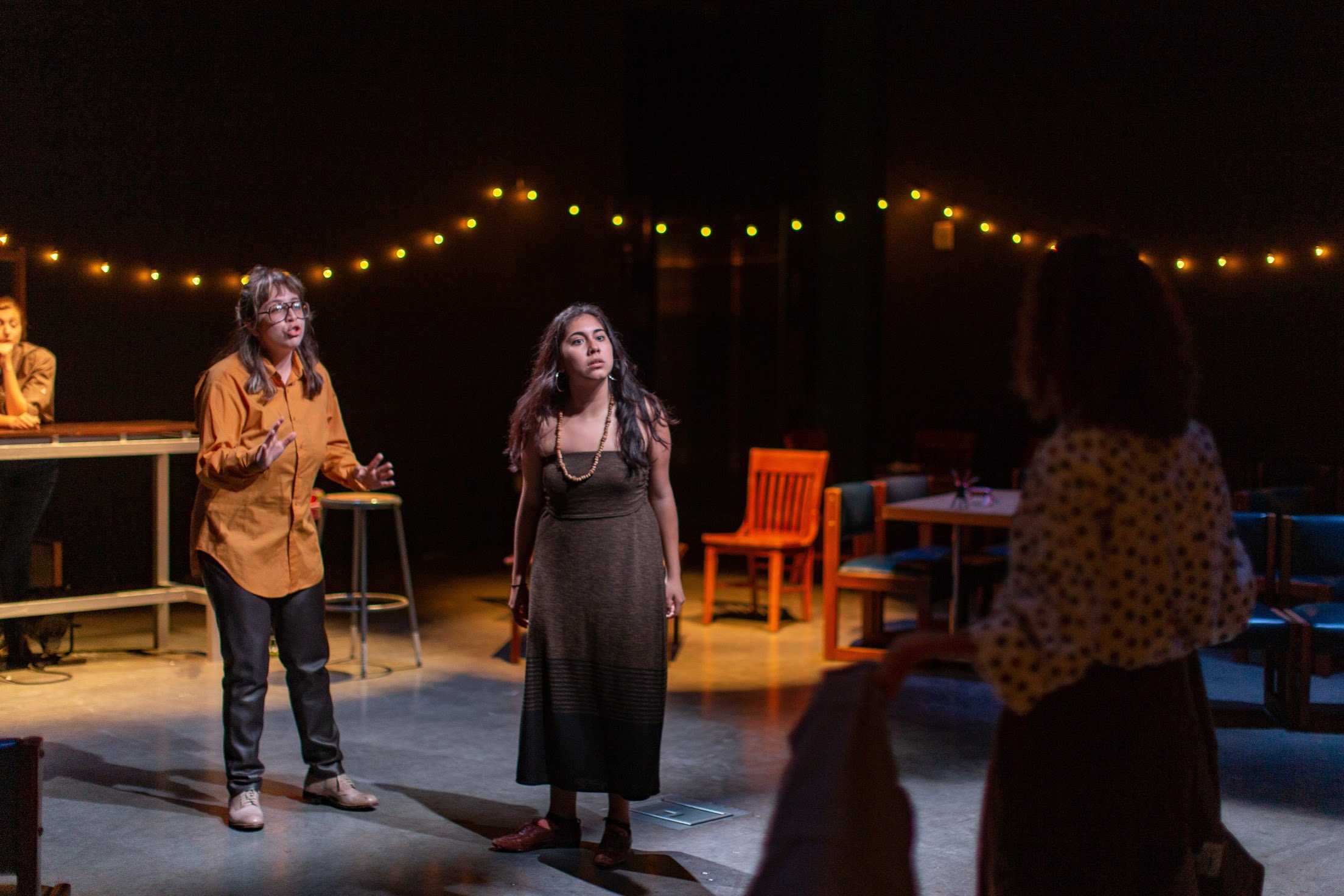Theatre students at the University of Texas at Austin recently collaborated on a performance of William Shakespeare’s “The Tempest,” taking a fresh approach that addressed the issue of gentrification and its consequences.
Audrey Loomis as Prospero, photographed by Anumeha Singh.
Story by Sage Foster
Instead of walking into a theater to watch UT’s production of “The Tempest,” audience members found themselves inside a coffee shop. The show, which ran from October 4-7, was held in the Student Activity Center Blackbox, a flexible space that directors Khristián Méndez Aguirre and Laura Baglereau were able to work with creatively. Upon entering the performance space, audience members approached the counter, where their tickets were taken and they were offered coffee or tea, the latter was served in trendy mason jars. The crowd found their seats at various coffee tables scattered around the space, and the performance took place in the middle of the room, making the audience feel involved in the narrative.
The decision to set the play in an East Austin coffee shop was motivated by Aguirre’s desire to work on a project that dealt with the issue of gentrification. “The Tempest” is a narrative characterized by colonialism. To Aguirre and the rest of the cast, twisting the message from an endorsement of colonialism to a critique of gentrification didn’t seem like too much of a stretch. “Shakespeare actually wrote ‘The Tempest’ as sort of pro-colonialism propaganda,” theatre junior Audrey Loomis says.
Ariane Stier as Caliban, photographed by Frank Urbine.
Loomis played Prospero, who is chiefly responsible for the colonization and displacement that takes place in the narrative. “The crazy thing is that those lines that I say, like those were actually written by Shakespeare and Prospero was still supposed to be the hero in the end,” Loomis says. “In our day and age, we read it and with our modern understanding we put a negative connotation on those lines, so it was easier than you would think to switch the narrative.”
The decision to set the play in gentrified East Austin was also informed by Aguirre’s personal experiences. “I also used to live in East Austin and I got kicked out of my house because it was too expensive,” Aguirre says. “The house I was living in belong to a Mexican-American family and it was kind of tied to my experience of being here, that they were based in East Austin and they got kicked out.”
Once they decided to change the setting to a coffee shop, other connections began to reveal themselves, such as the fact that coffee plantations are tied to colonization and slavery. “Everything served in the coffee shop, the coffee, the sugar, the tea – it was all tied to colonialism,” Aguirre says. In some instances throughout the performance, actors would actually come by and bus the audience members tables, emphasizing the audience members’ participation in and contribution to gentrification by living in Austin.
The shift in location and setting was not the only change the directors and cast made to the classic Shakespearean comedy. The character of Calibán, a Mexican-American woman whose mother owned the authentic Mexican coffee shop before Prospero arrived, was played by junior Ariane Stier. “In past productions and in the language of the text Cáliban is supposed to be a monster, and is described as super ugly and deformed,” Stier says. In the original play, Cáliban is the only native person left on the island when the colonizers arrive. “The depiction of Cáliban is obviously incredibly racist and offensive so we wanted to change that in this production. We made her a strong, authentic Latina woman. There’s nothing monstrous about her and that’s the message we’re trying to get at.” Stier says.
Mireya Luna as Ariel, photographed by Frank Urbine.
Since the directors left most of the script unaltered, there are many instances within the text in which European characters refer directly to Cáliban as a monster. From a modern, localized perspective, these words from white men in positions of power directed at a woman of color who is a service industry employee powerfully illustrate pervasive gender and power dynamics. Stier, who worked in the service industry throughout the summer, found the experience familiar. “Throughout the process, I started to feel like Cáliban was like me in so many ways and it was really cathartic as a person of color and as an actor to be able to live that out on stage in a space that I knew I was safe to live those emotions out in,” Stier says. “When those super racist things are happening it doesn’t feel great but in a way it’s kind of like, ‘Yeah this is what happens and I want you to see it.’ That’s something that I haven’t gotten before in a play and especially not in Shakespeare show.”
Another character that was altered and granted a greater sense of agency in UT’s production of the play was that of Prospero’s servant Ariel, played by junior Mireya Luna. Luna says her character had essentially no personality at all in the original text, but she worked together with Aguirre and Baglereau to add meaningful dimension to her role. In their production, Ariel and Cáliban are the two only remaining Mexican-American employees in the coffee shop, and Ariel’s character is a struggling but talented musician whose music is being appropriated by Prospero to advance his goals. “In a way that hits home as an artist and as a woman of color,” Luna says. “I also drew from my own experiences, as someone who is a young artist in Austin, and how maybe sometimes I feel affected by people I’ve worked with who are like, ‘Oh you’re so talented,’ but sometimes it feels a little like maybe I’m being exploited, like I’m sort of a token brown person.”
Loomis also reflected throughout the process on her own identity and privilege as a white woman, and how this influenced her role in the production. “When you do art that is giving agency to people of color and people who don’t always have it in real life, as a white person being involved in it you’re going to have to play an unlikable character and just make your peace with that,” Loomis says. “You have to realize that it’s not your time to be the hero, it’s your time to aid the story.”
Luna, who lives in Riverside, says the narrative of gentrification is one that needs to be told now more than ever. “My sister used to live in Austin, and it was super cheap. But now you’re lucky if you can afford to live here,” Luna says. “It is interesting to see the divide in the city, like, ‘Oh look there’s all these cute little Instagram worthy ice cream shops,’ and then you see people walking to the bus from their long jobs, and those are the people that get looked down upon.”
For some of us, it can be easy to forget that UT does not exist separately from the city, and that the activities and very existence of the university itself influence the lives of people in the greater Austin area, and that the effects aren’t entirely positive. “I don’t think people see the other side of things, which is that people are getting displaced, and that it’s disproportionately communities of color,” Stier says. Luna agrees. “I want people to come out of this and be aware of how your community – whether that’s where you work, your friend circle, who you give your business too – how they treat people of color, women, women of color,” Luna says. “Because we sometimes don’t notice the way we objectify and dehumanize people, whether its by a job title or the color of their skin. I think as a community each individual needs to start taking accountability for how we participate in that.”














































